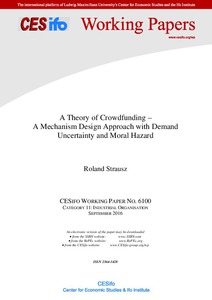A theory of crowdfunding - a mechanism design approach with demand uncertainty and moral hazard
"Crowdfunding provides innovation in enabling entrepreneurs to contract with consumers before investment. Under aggregate demand uncertainty, this improves screening for valuable projects. Entrepreneurial moral hazard and private cost information threatens this benefit. Despite these threats, p...
| Main Author: | |
|---|---|
| Institution: | ETUI-European Trade Union Institute |
| Format: | TEXT |
| Language: | English |
| Published: |
Munich
2016
CESifo |
| Subjects: | |
| Online Access: | https://www.labourline.org/KENTIKA-039412485769-a-theory-of-crowdfunding---a-m.htm |
| Summary: | "Crowdfunding provides innovation in enabling entrepreneurs to contract with consumers before investment. Under aggregate demand uncertainty, this improves screening for valuable projects. Entrepreneurial moral hazard and private cost information threatens this benefit. Despite these threats, popular crowdfunding schemes are able to implement optimal screening mechanisms. Crowdfunding’s after-markets enable consumers to actively implement deferred payments and thereby optimally manage the entrepreneur’s incentives. Efficiency is sustainable only if expected returns exceed an agency cost associated with the entrepreneurial incentive problems. By reducing demand uncertainty, crowdfunding promotes welfare and complements traditional entrepreneurial financing which focuses on controlling moral hazard." |
|---|---|
| Physical Description: | 52 p. Digital |

